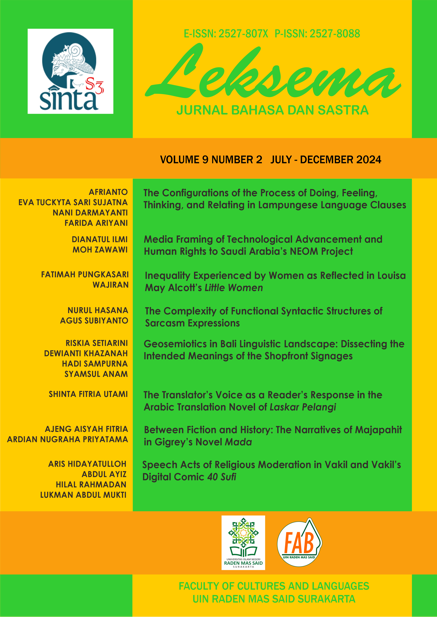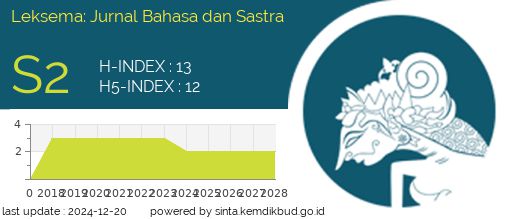SPEECH ACTS OF RELIGIOUS MODERATION IN VAKIL AND VAKIL'S DIGITAL COMIC '40 SUFI'
DOI:
https://doi.org/10.22515/ljbs.v9i2.8477Abstract
This study discusses representative speech acts in digital comic discourse created by Mohammed Arif Vakil and Mohammed Ali Vakil reflecting the religious moderation among societies. The comic discourse campaigns for the importance of tolerance between human beings. The analysis focuses on the reflection of religious moderation in one chapter entitled ‘Ethic’ which describes the relation among human beings. The chapter is chosen due to its message which focuses on relation among people. The data of this research were obtained from the whole texts and pictures in the chapter. The texts in the comic became the main data whereas the images were put as secondary data. These data were then processed and classified into several speech act classifications proposed by Searle. The result shows that the most dominant speech act performed by the comic maker is representative speech acts. Meanwhile the directive speech acts are commonly used to give the direct moral lessons. The chapter reflects religious moderation in three points i.e. (1) applying good attitudes to others; (2) reflecting the moral value; (3) helping others without hurting the feelings by applying the representative and directive speech acts to convey the religious moderation. The representative speech acts function as the utterances of giving statement and admitting about something related with good deeds and never hurting others while the directive speech acts functions as the utterances of requesting, asking, and recommending certain things. The directive speech acts take the roles as the directive meanings on moral values.
Downloads
References
Almwajeh, Motasim and Luqman M Rababah. 2019. “There Is More to It than Meets the Eye: An Intercultural Study of Religious Speech Acts between Jordanian and American Students”. International Journal of Linguistics 11 (1): 34-45. DOI: 10.5296/ijl.v11i1.14261.
Aristo, Thomas Joni Verawanto and Frederykus Ege. 2018. “The Analysis of Speech Act in a Comic Conversation”. Journal of English Educational Study 1 (1): 34-42. DOI:10.31932/jees.v1i1.279.
Austin, John L. 1962. How to Do Things with Words. London: Oxford University Press.
Cummings, Louise. 2005. Pragmatics: A Multidisciplinary Perspective. Edinburgh: Edinburgh UniversityPress. DOI: 10.4324/9781315045580
Izar, Julisah, M. Muslim Nasution, Rengki Afria, and Neldi Harianto, and Mar’atun Sholiha. 2021. “Expressive Speech Act in Comic Bintang Emon’s Speech in Social Media about Social Distancing”. Titian: Jurnal Ilmu Humaniora 5 (1): 148-158. DOI:10.22437/titian.v5i1.13100.
Morrow, Phillip R and Kenta Yamanouchi. 2020. “Online Apologies to Hotel Guests in English and Japanese”. Discourse, Context & Media. 34 (April): 1-10, doi:10.1016/j.dcm.2020.100379.
Rijadi, Arief. 2019. “Communication Functions in Speech Act Tolerance in The Multiethnic Community Interaction in East Java as a Representation of Ecological Establishment in East Java”. Pancaran Pendidikan 7 (4): 41-56. DOI: 10.25037/pancaran.v7i4.208.
Searle, John R. 1969. Speech Act: An Essays in the Philosophy of Language. Pennsylvania: The University of Pennsylvania Press.
Searle, John R and Daniel Vanderveken. 1985. Foundation of Illocutionary Logic. Cambridge: Cambridge University Press.
Sinaga, Martin Lukito. 2022. “Religious Moderation”. Jurnal Masyarakat dan Budaya 24 (3). DOI: 10.55981/jmb.2022.1821
Taufiqurrahman, Febri. 2021. “The Meaning of Tolerance in K. H. A. Hasyim Muzadi’s Speech at the Presidential Palace: A Critical Discourse Analysis”. ELT-Lectura 4 (1): 56-66. DOI:10.31849/elt lectura.v4i2.6286.
Tsoumou, Jean Mathieu. 2020. “Analysing Speech Acts in Politically Related Facebook Communication”. Journal of Pragmatics 167 (2): 80-97. DOI: 10.1016/j.pragma.2020.06.004.
Vanderveken, Daniel. 1980. “Illocutionary Logic and Self-Defeating Speech Acts”. In John R Searle, Ferenc Kiefer, Manfred Bierwisch (eds.). Speech Act Theory and Pragmatics. Dordrecht: D. Reidel Publishing Company
Wijana, I Dewa Putu. 1996. Basics of Pragmatics. Yogyakarta: Andi Offset.
Downloads
Published
Issue
Section
License
Copyright (c) 2024 Leksema: Jurnal Bahasa dan Sastra

This work is licensed under a Creative Commons Attribution-NonCommercial-ShareAlike 4.0 International License.
The copyright of the received article shall be assigned to the publisher of the journal. The intended copyright includes the right to publish the article in various forms (including reprints). The journal maintains the publishing rights to published articles.
In line with the license, the authors and users (readers or other researchers) are allowed to share and adapt the material only for non-commercial purposes. In addition, the material must be given appropriate credit, provided with a link to the license, and indicated if changes were made. If authors remix, transform or build upon the material, authors must distribute their contributions under the same license as the original.







